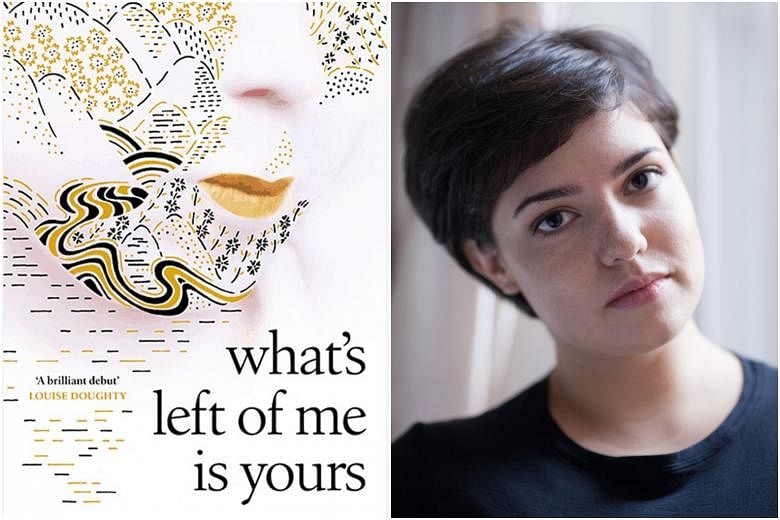SINGAPORE - Ten years ago in Japan, a man was sentenced for murdering a woman.
What gripped the world, however, was that the murderer was a wakaresaseya agent, a professional marriage wrecker hired to seduce the victim by her own husband to generate grounds for divorce.
The wakaresaseya agent, however, fell in love with his mark and she with him. After his arrest, he confessed: "I still love her."
Singapore-born British writer Stephanie Scott read about this case in 2010. "I wondered if that could possibly be true, if you could love someone and kill them," says the 37-year-old over the telephone from her home in London.
A quote from Leo Tolstoy's Anna Karenina, the classic Russian novel about divorce, came to mind: "There are as many kinds of love, as there are hearts."
Thus was planted the seed for her debut novel What's Left Of Me Is Yours, a work of fiction that draws on, but departs substantially from the 2010 case.
"I really wanted to explore the role that love has in our lives, what it means to each of us and how someone's survival can hinge on another person," she says. "How we love and what we do in the name of love."
In What's Left Of Me Is Yours, young lawyer Sumiko discovers that her mother Rina was not killed in an accident when Sumiko was a child, as her grandfather had told her, but murdered.
Determined to get to the truth, Sumiko digs up secrets that her grandfather had buried to spare her, learning that her father had hired a wakaresaseya agent, Kaitaro, to break up his marriage with Rina, only for Kaitaro and Rina to genuinely fall in love.
Scott was born in Singapore to a British father and Singaporean mother, and grew up in Woodleigh Park until she was sent to boarding school aged 11.
An affinity for both news and the law runs deep in her family.
Her maternal grandmother, Mrs Rosalind Ratnam, was the first female partner of law firm Allen & Gledhill, while both her grandfathers, Mr Ronald Scott and Mr Saba Ratnam, worked for The Straits Times as ST Group deputy managing director and The Sunday Times editor respectively.
Her father, Mr Roger Scott, was general manager at Times Printers.
Stephanie Scott always wanted to be a writer and studied English literature at university but, as "a good Singaporean daughter", got a job in investment banking and spent several years working in finance.
She was offered a vice-president role, but decided instead to give it all up to pursue a creative writing master's degree at Oxford University.
"My father was shouting so much, I had to put down the phone," she recalls.
"But I knew this was what I'd always wanted to do all my life, quite secretly - I'd never told anybody - and I realised that if I didn't take the leap at that time, I might never have the opportunity to do so again."
It took her 10 years to write the novel, during which she travelled to Japan. She took up photography, which Rina and Kaitaro bond over in the novel. She met Mr Richard Lloyd Parry, the Asia editor of The Times who covered the 2010 murder trial, and interviewed lawyers and wakaresaseya agents.
One of the break-up agents told her that, in many ways, he feels like a psychologist.
Scott says: "I think there is still a great deal of difficulty in accessing help for mental-health issues in Japan. People are often left to deal with these relationship struggles alone, and they come to him."
Her research was so in-depth that she was awarded a British Association of Japanese Studies Toshiba Studentship for anthropological work and was even made a member of the British Japanese Law Association, a rarity for a non-legal professional.
When she rereads the novel today, she still feels the physical energy of the scene of Rina's murder "like a poltergeist".
She says: "When I was writing, I was very interested in the way that murder victims often become defined by their deaths. I wanted to reclaim her story, I wanted her to be celebrated for her life."
Scott and her husband contracted Covid-19 in April and she still feels its after-effects, such as breathlessness and fatigue.
She had to do online author events while ill. "You just put on a lot of make-up and pull it together," she quips. "Not quite how I planned to send my book out into the world - but it's here now."
She hopes next to write a World War II novel set in Singapore and Malaya. Both sides of her family were caught up in the war; her paternal grandfather fought with the British army in Burma, while her maternal grandmother hid from the invading Japanese in rubber plantations.
"I'm really interested in looking at how my family came together and tying that into the development of Singapore as a nation, gaining independence," she says.
• What's Left Of Me Is Yours ($27.95) is available at bit.ly/WLMYours_SScott


